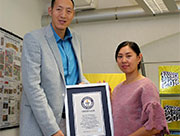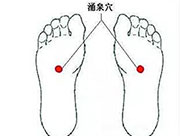

U.S. President Barack Obama's National Security Advisor Susan Rice speaks on the U.S.-China ties at the George Washington University in Washington, D.C., the United States, Sept. 21, 2015. "We reject reductive reasoning and lazy rhetoric that says conflict between the U.S. and China is inevitable, even as we've been tough with China where we disagree," Susan Rice said here in a speech on Monday. (Xinhua/Yin Bogu)
WASHINGTON, Sept. 21 (Xinhua) -- On the eve of the upcoming state visit to the United States by Chinese President Xi Jinping, a top American foreign policy official vowed Monday that the U.S.-China relationship is not a zero-sum game, as the U.S. is "steadily and methodically expanding the breadth and depth of our cooperation with China."
"We reject reductive reasoning and lazy rhetoric that says conflict between the U.S. and China is inevitable, even as we've been tough with China where we disagree," U.S. President Barack Obama's National Security Advisor Susan Rice said in a speech on the U.S.-China ties at the George Washington University.
Rice noted that, under the Obama administration, the U.S. has "deepened our engagement with China at every level -- maximizing our cooperation on areas of mutual interest while confronting and managing our disagreements."
"This isn't a zero-sum game. Our capacity to manage our differences is greater than that," she stressed.
The top U.S. official on foreign policy said President Obama will "continue our frank and comprehensive discussions when he welcomes President Xi to the White House later this week for a State Visit."
President Xi will start his first state visit to the U.S. Tuesday in Seattle, Washington state, before traveling to Washington D.C., the U.S. national capital, for a summit meeting with President Obama Friday.
"Over the past two years, President Xi and President Obama have spent many hours meeting in formal and informal settings, as well as communicating through phone calls and letters, because many global challenges today can only be met with China and the United States working in concert," Rice said.
Pointing to the U.S. media's disproportional focus on the U.S.-China differences on issues such as cyber security and the South China Sea dispute, Rice warned that it "can be easy to lose sight of the larger arc of progress in our bilateral relationship with China."
Rice reiterated that pursuing "a productive relationship with China" is a critical element of the larger strategy of the U.S. for the Asia Pacific as it is implementing the so-called Rebalance to Asia strategy to expand its engagement in this dynamic region.
The U.S. "welcomes a rising China that is peaceful, stable, prosperous, and a responsible player in global affairs," Rice said.
Rice also acknowledged that it is natural that China takes on greater leadership to match its economic development and growing capabilities. "When China is invested in helping resolve regional and global problems, the United States - and the world - benefits," she said.
"And, we will continue taking steps to build a productive, cooperative relationship with China that delivers benefits for both our peoples. That's a central pillar of our strategy in Asia," she said.
Rice listed the achievements of the deeper engagement and cooperation between the two sides in various fields, such as enhancing bilateral trade, dialogues, people's and the military-to-military exchanges, and strengthening cooperation on many global issues including the Iranian nuclear talks, denuclearization of the Korean Peninsula, Afghanistan, climate change, and fighting the Ebola epidemic.
"So, we are steadily and methodically expanding the breadth and depth of our cooperation with China. Our story is, overwhelmingly, one of progress," Rice said. "Still, the reality is we face difficult challenges. And, we never shy away from pressing our concerns."
Meanwhile, Rice highlighted some of the major differences between the two countries on issues such as China's economic policies, cyber security, maritime disputes in East and South China Seas, and human rights.
She predicted that the two presidents will discuss these issues during their summit meeting at the White House Friday.
"This is a vital relationship of the 21st century, and we have to be upfront about our differences, because they are preventing us from reaching the full potential of our cooperation," Rice said.
"We want the Chinese people to succeed. When China and the United States work together, the world is more secure and more prosperous. That's the truth," she said.
At a final note, Rice vowed that building a stable, productive, and resilient relationship with China "will remain at the center of American foreign policy for years to come."
Related:
Spotlight: China, U.S. could work together to build better global financial system
NEW YORK, Sept. 19 (Xinhua) -- China and the United States could work together to improve the global financial system in order to achieve a stable and sustainable economic development for the world, officials and experts said at a symposium here recently.
As economic integration between the two countries and their influence on the rest of the world grew, the coordination of economic policies between them became much more important, said Chinese Vice Finance Minister Zhu Guangyao at the symposium titled "Building the Financial System of the 21st Century: An Agenda for China and the United States." Full story
Spotlight: China-U.S. trade shifts towards balance, sustainability
BEIJING, Sept. 20 (Xinhua) -- Economy and trade are perhaps the area where China and the United States have most of their converging interests and where they have achieved substantial and mutually beneficial gains through cooperation and management of differences.
It is worth mentioning that, with the rise of China's middle class and market entry made easier by such means as e-commerce and such mechanisms as a bilateral investment treaty (BIT) in the future, the China-U.S. trade structure is becoming more balanced and sustainable. Full Story
Spotlight: China, U.S. pin high hopes on Xi's visit for breakthrough in BIT talks
BEIJING, Sept. 20 (Xinhua) -- Pushing for earlier completion of their marathon talks on a Bilateral Investment Treaty (BIT), both China and the United States have placed high hopes on President Xi Jinping's Sept. 22-25 state visit for a breakthrough.
But, as stumbling blocks in the way are not easy to remove, painstaking efforts from the world's first and second largest economies are demanded to conclude the BIT talks at an earlier date, so as to benefit both countries and the global economy. Full story
Xi's U.S. visit to promote bilateral investment treaty negotiation: expert
NEW YORK, Sept. 19 (Xinhua) -- Chinese President Xi Jinping's upcoming state visit to the United States will push forward the negotiation for a bilateral investment treaty between China and the United States, a Chinese scholar said here Friday.
Expanding investment cooperation will propel China-U.S. relations, said Huo Jianguo, a researcher with the Chinese Academy of International Trade and Economic Cooperation. Full story
China open to foreign media, eyeing closer cooperation with U.S.: President Xi
BEIJING, Sept. 18 (Xinhua) -- President Xi Jinping on Friday said China will continue to be open to foreign media and he looks forward to more cooperation and understanding between China and the United States.
"[We] welcome foreign media and correspondents to cover China stories, introducing China's development to the world, and helping the world grasp the opportunities [afforded by] China's development," Xi said as he met with Rupert Murdoch, executive chairman of News Corp. at the Great Hall of the People. Full story
Xi's U.S. visit to promote bilateral investment treaty negotiation: expert
NEW YORK, Sept. 19 (Xinhua) -- Chinese President Xi Jinping's upcoming state visit to the United States will push forward the negotiation for a bilateral investment treaty between China and the United States, a Chinese scholar said here Friday.
Expanding investment cooperation will propel China-U.S. relations, said Huo Jianguo, a researcher with the Chinese Academy of International Trade and Economic Cooperation. Full story
 |
Day|Week

 Stunning photos of air show in China’s V-Day parade
Stunning photos of air show in China’s V-Day parade Bikini models compete in oriental beauty pageant
Bikini models compete in oriental beauty pageant Archaeologists find 4,000-year-old sentry post in Shaanxi
Archaeologists find 4,000-year-old sentry post in Shaanxi Chinese couple claim title for Guinness world's tallest married couple
Chinese couple claim title for Guinness world's tallest married couple Left-behind child faces separation from father after summer vacation
Left-behind child faces separation from father after summer vacation Scenic Liangshan: Photographers' paradise
Scenic Liangshan: Photographers' paradise Amazing China-made flying car expected to serve in the army
Amazing China-made flying car expected to serve in the army Bikini boxing on opening day of a bar in Taiyuan
Bikini boxing on opening day of a bar in Taiyuan Have you met her? Campus belle from Wuhan University
Have you met her? Campus belle from Wuhan University Expert reveals top five longevity acupuncture points
Expert reveals top five longevity acupuncture points